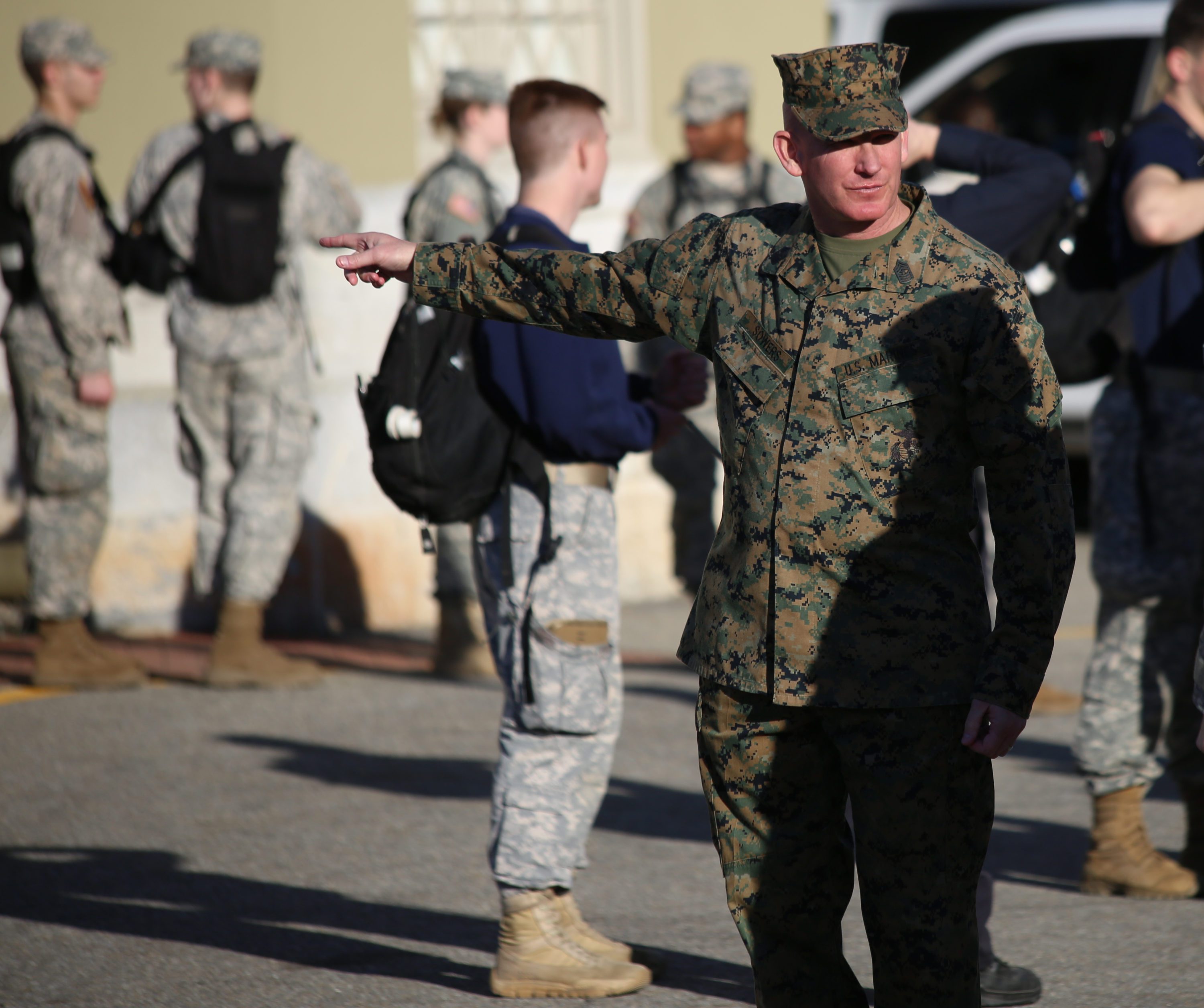Sgt. Maj. Sowers: Setting the Standard

Sgt. Maj. Sowers during Breakout Feb. 2, 2019. Photo by Micalyn Miller, VMI Alumni Agencies.

Sgt. Maj. Sowers during Breakout Feb. 2, 2019. Photo by Micalyn Miller, VMI Alumni Agencies.
In summer 2018, Marine Corps Command Sgt. Maj. William T. Sowers assumed the duties of Institute and Corps sergeant major. Just the third person to hold the position since it was created in 1990, Sowers served 30 years in the Marine Corps, mainly in infantry units, although he served two tours “on the drill field” in Parris Island and San Diego. He began his service in 1988 at age 17, inspired by the many veterans he knew growing up in the Southside town of Stuart, Virginia.
“Growing up, I was surrounded by veterans,” he remembered. An uncle had been an Army machine-gunner in Vietnam. One of Sowers’ neighbors was a Seabee in World War II, and his pastor served as a Marine in Vietnam. “These men had served, come home and become extremely productive citizens.”
Unlike most of these men, Sowers kept serving after his initial enlistment. “I enjoyed what I did, and I thrived in an environment in which I served with high-quality Marines. Furthermore, many great leaders helped me develop as a Marine and a leader, and I wanted to continue that legacy.”
He credits his wife for providing the support that allowed him to continue his career. “I am blessed with a good wife who understood what serving meant to me as well as the demands of the service. It takes a special individual to put up with all the moves and the long deployments,” said Sowers.
Although he had no direct connections to VMI, he had long been aware of it. “In school, I took courses in Virginia history and, when studying the Civil War, learned about the New Market cadets. Beyond that, VMI has a statewide reputation for being a tough and demanding place that turns out capable graduates who go on to do important things.”
Sowers became more closely acquainted with VMI by serving with alumni in the Marines. He provided a few examples. “When I was serving with the 3rd Battalion of the 8th Marines, I met then-Second Lieutenant Jason Berg ’99. Right away, I knew there was something special about him. He was all substance and no flash. He knew his job thoroughly and got on with doing it.”
“At my final duty station, the 1st Marine Division, there were 11 combatant commands, and three of them were led by VMI graduates. Lieutenant Colonel G.D. Hasseltine ’97 commanded the 1st Reconnaissance Battalion. Colonels Christopher Gideons ’91 and George H. Schreffler III ’94 commanded the 1st Marines and 5th Marines, respectively. All of them were impressive officers and leaders.”
As he approached retirement, Sowers had an abundance of job opportunities, but none of them stood out. “Then, another Marine sergeant major sent me a message about the VMI job. It immediately struck me as a great opportunity to serve and to influence the next generation of leaders.”
Throughout the application process, Sowers competed with many other well qualified and highly experienced candidates. Asked what made Sowers stand out, Col. William J. Wanovich ’87, commandant of Cadets, said, “Clearly, he was used to living up to and setting high standards. He exuded energy and enthusiasm. What impressed me and others was that he arrived with a good understanding of VMI. He had done his homework, to include traveling from California to Lexington to speak with VMI’s first sergeant major, Al Hockaday.”
As the 1st Marine Division’s command sergeant major, Sowers dealt with 23,000 Marines and sailors. At VMI, he interacts with approximately 1,600 cadets. It is a change in which Sowers delights. “At the division, I was influencing policy more than I was influencing people. To many, I was a name and a photograph on a wall. Here, I directly interact with 1,600 young men and women, and that gives me an opportunity to help them live up to their full potential.”
Regarding what about VMI has impressed him so far, he replied, “There is a sense of history and tradition, and there is a sense of purpose, a sense of mission, here. I can see why people are drawn to it.”
He continued, “The chaplain, Col. Bob Phillips [’87], told me something early in the year that has stuck with me and always will. After seeing several young people leave barracks, I said to him, ‘Well, VMI isn’t for everybody.’ He replied, ‘Sergeant major, VMI is not for most people.’ That told me that it takes a special calling to come here – and to stay here.”
Sowers also mentioned what he calls “the intangibles” of VMI. “You know that, by going through a common experience, they form lifelong friendships. In barracks, they learn things that will stick with them for life, like integrity, a sense of service and leadership. Most cadets come here with strong values, and VMI reinforces them.”
“I also like how integrated everyone is,” he continued. “There are no companies with, say, only Army ROTC cadets and no special areas in barracks reserved for certain cadets. So, cadets learn to live and work with others, and this teaches them to be civil. Those are good skills to have in life, regardless of your career choice.”
Although, as Wanovich said, Sowers did his homework about VMI, there was one thing that has surprised him. “I was somewhat skeptical when I heard that most activities were ‘Corps-led,’” he said. “So, I was a little surprised to see just how true that was and extremely pleased to see how well cadets fulfill those responsibilities – how cadets teach other cadets. Do they make mistakes? Sure. But by and large, we place an immense amount of faith and trust in our upper-class cadets, and they don’t let us down.”
Alumni from the classes prior to 1990 did not have the experience of having senior noncommissioned officers as a permanent part of the commandant’s staff. When asked what role Sowers and the two battalion training NCOs – Sgt. 1st Class Carmelo Echevarria and Sgt. 1st Class Christopher Bean – have in barracks, Wanovich replied, “It’s about standards. These NCOs do what NCOs do throughout the military: They know the standards, and they ensure VMI meets them.
“Senior NCOs also bring a no-nonsense approach that cadets find appealing. Cadets know they came up through the ranks because they did the hard jobs. That knowledge means that cadets count on them to provide common-sense advice and answers.”
To Wanovich, the NCOs fit in well with VMI’s overall ethos. “VMI is a place where everyone works hard because they know that’s what gets things done. NCOs bring that ‘go-to-work’ mentality to barracks, and that helps strengthen the ‘can-do’ attitude that cadets develop.”
Regarding how Sowers fits in at VMI, Wanovich explained, “He quickly grasped all aspects of VMI. He did that through a daily interaction with the post, what is known in the military as ‘leadership by walking around’ and by attending a lot of meetings, such as those of the VMI Board of Visitors and the academic board. Some people might find that surprising, but in order to be as effective as possible in his work, he needs to understand what makes this place tick, not just how barracks works.”
“In barracks,” Wanovich continued, “he has established himself with the Corps by setting great standards and conducting a dialogue with cadets. Most important, he applies his expertise and experience to accomplishing one goal: Helping cadets become more effective as leaders.”
Summing up what he does at VMI, Sowers said, “Here, I continue to serve my country by influencing the development of its future leaders, whether or not they will serve in the military and lead others into harm’s way. Considering that, I count myself blessed.”

The communications officer supports the strategy for all communications, including web content, public relations messages and collateral pieces in order to articulate and promote the mission of the VMI Alumni Agencies and promote philanthropy among varied constituencies.